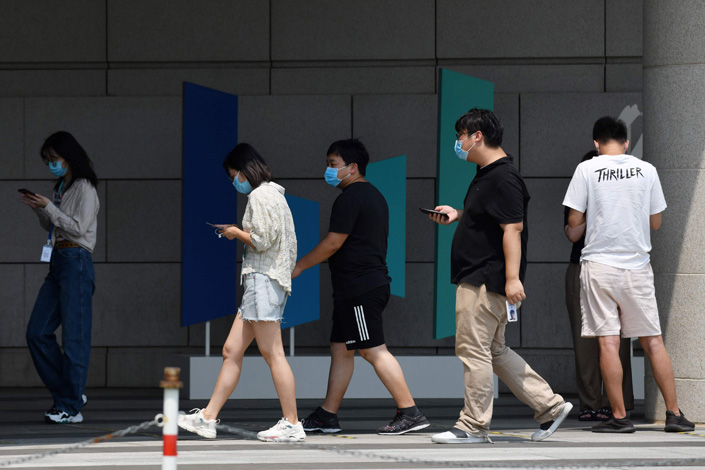In Depth: Plight of China’s Gig Workers Poses Policymaking Dilemma

A series of complaints over employee mistreatment has left China’s once coveted tech sector confronting a broad range of labor issues amid a fierce nationwide debate and increased regulatory tightening, forcing some of the biggest players in the sector to adjust their workplace culture in order to attract and retain talent.
Short video company Kuaishou Technology announced on June 24 it is formally ending its weekend overtime policy known as “big/small weeks” that required staff to work on every other Sunday. Its rival, TikTok operator ByteDance Inc. soon followed suit, lifting the long-standing policy in August.
 |
Employees pass by ByteDance’s headquarters in Beijing on July 8, 2020. Photo: VCG |
While some employees at these big tech firms are rejoicing over getting their full weekends back, the country's more precarious workers at on-demand platforms — who are often low-skilled, highly replaceable and thus have less bargaining power — are still struggling with poor working conditions and lack of comprehensive labor protections.
These issues have exposed a longstanding regulatory gap with regard to the rights and protections of workers for China’s online platforms. For now, the government is walking a fine line as it attempts to find a middle ground between directing a more compassionate treatment of workers and the potential impact on the business of platform companies resulting from a rise in associated costs if they were to provide workers with proper labor contracts and social insurance coverage.
The problem
For a decade, China’s online platforms have been encouraged to grow at all costs, generating millions of jobs with a low entry threshold. The country’s gig economy, of which these platforms are a major part, has seen significant growth, with 200 million people involved in “flexible employment,” according to the Ministry of Human Resources and Social Security in May (link in Chinese). Consulting firm iResearch estimates that the overall gig market is expected to reach more than 1 trillion yuan (link in Chinese) next year.
Revenue and user growth of on-demand service providers such as Meituan and Alibaba-owned Ele.me Inc., e-commerce platforms like Taobao and JD.com, and ride-hailing firms including Didi Chuxing Technology Co. Ltd., have been fueled by the millions of takeaway riders, couriers and drivers who work tirelessly under a punitive rating system amid fierce market competition.
More than 95% of takeout delivery workers toil more than eight hours a day, with 28% working 12 hours a day, according to a 2020 research report conducted by Beijing Yilian Legal Aid and Research Centre of Labor (link in Chinese). More than 44% of these workers are hauling over 800 orders every month.
Besides a relatively unstable income, the delivery workers say they face added pressure stemming from the risk of poor customer ratings, traffic accidents, adverse weather conditions, difficult access to delivery destinations and tight deadlines.
Meanwhile, Didi, the biggest player in the country’s passenger-ride market, has been accused of paying its drivers unfairly by charging excessive commission, as well as allowing drivers to work overtime, resulting in fatigue. Didi Global Inc. said in its IPO prospectus that it has 15 million active drivers globally as of March 2021.
A push from the government
China’s regulators have urged its on-demand sector to put greater emphasis on gig workers’ rights, with ministries and government agencies publishing guidelines in the past two months on strengthening labor relations in this new segment of the economy.
Just last week, Li Huaqiang, deputy director of transport services at the Ministry of Transport, called for ride-hailing firms to set reasonable rates for driver pay, reveal these rates to the public, use algorithms to manage driver fatigue and limit working hours, and provide drivers with contracts and social insurance coverage.
The statement comes after a guideline published on July 15 by the Ministry of Transport and six other government agencies called for better protection of the rights of couriers and delivery workers (link in Chinese), including providing them with more reasonable salaries and social insurance.
Another guideline dated July 16 was released by the Ministry of Human Resources and Social Security and seven other agencies, focusing on the basic rights of workers in “new employment forms” (link in Chinese). And on July 26, the State Administration for Market Regulation (SAMR) and six other government agencies released a guideline specifically targeting food delivery platforms (link in Chinese), pushing companies to guarantee above minimum-wage income, as well as social security and insurance coverage for workers.
According to Lu Jingbo, founding and managing partner at River Delta Law Firm in Shanghai, the guidelines “send a clear regulatory signal” to the platform economy over labor rights.
“The guideline on new forms of work can be seen as a general regulation, while the other two on couriers and takeout deliverymen are targeted at these two groups and are more specific,” Lu, who is an expert on China’s labor law, told Caixin.
Problems with the government solution
However, Lu pointed out that some of the suggestions are “innovative measures” outside the purview of current laws and regulations and will require effective execution by relevant local departments to achieve the desired outcome.
The guidelines, which aren’t written into law yet, are a rather cautious move that has avoided some theoretical and qualitative issues for the time being, he said.
For example, the guideline targeting takeout delivery workers pushes platforms and third-party companies to provide social insurance entitlements to “workers with an established labor relationship” (劳动关系) — but the precise criteria or regulatory direction for determining such a relationship is not spelled out.
This has been a recurrent issue in labor disputes involving internet platform operators brought before Chinese courts. A white paper (link in Chinese) issued in April 2018 by the People’s Court of Chaoyang District in Beijing stated that out of the 171 labor cases concluded by the court from 2015 to the first quarter of 2018, more than 84% involved a dispute between parties over the existence of a labor relationship.
“Arbitrary personnel management, flexible and diversified methods of salary payment and ambiguity in the scope of business have all created hurdles in establishing a labor relationship,” the court stated, adding that it is recommended that online platforms precisely distinguish between labor and non-labor relationship classifications and standardize management of these two groups of staff.
At Meituan, for example, there are two main types of riders: Full time, also known as zhuansong (专送) who are hired directly by the company; and part time, known as zhongbao (众包), who are hired from third-party fast-delivery companies or individual contractors.
This approach has allowed shared economy platforms to circumvent formal labor contracts and thus reduce costs on entitlements such as social security and medical insurance, as well as on career development and human resources management.
Hao Zhengxin, a lawyer who has long been providing legal advice to gig workers, told Caixin that in current judicial practice, it is very difficult for part-time delivery riders to establish a labor relationship with the companies they work for. When a part-timer sustains an injury from an accident, the platform basically won’t take responsibility. As for full-time workers, only some end up getting labor relationships clarified legally in such a way that compels the platforms to take responsibility.
Meituan said by the end of 2020, a total of 9.5 million delivery riders had received an income from its platform. Out of its full year revenue of 66.2 billion yuan from food delivery, the company spent 48.7 billion yuan, or 74%, on rider costs. If the company were to enter into a contractual labor relationship with each part-time worker and provide them with social security, the related costs would go even higher, making it a concern for investors who have factored the company’s low insurance-cost model into their investment decisions.
And the violent reaction from capital markets could make companies even more reluctant: Meituan’s Hong Kong-traded shares plummeted a record 29% in the two days following the release of the SAMR guideline. Stocks in courier companies including Yunda Holding Co. Ltd. (002120.SZ) and Shentong Express Co. Ltd. (002468.SZ) saw a 5.8% and 4% drop respectively in the two days following the release of the guideline by the Ministry of Transport.
In contrast, Kuaishou’s shares jumped 4.8% on June 25, the day after it announced the cancellation of its “big/small weeks” policy.
From a market perspective, the regulations are a sign of a rise in the cost for employing takeout riders and ride-hailing drivers, industry insiders pointed out.
 |
Kuaishou’s headquarters in Beijing, on July 28. Photo: VCG |
“If Meituan has to start covering the social security costs for their riders, it will have to raise the service fees for deliveries. This will force the company to rethink its competitive pricing strategies,” a senior HR officer at a large internet company told Caixin.
“On the other hand, the cancellation of overtime and reduction in working hours (of full-time employees) is viewed as a decrease in human resources cost,” he added.
At the same time, the guideline pushes platforms to give takeout riders more relaxed delivery deadlines by using a moderate algorithm, which could directly prolong users’ waiting time for a meal, and is thus seen by the company as another factor that could hurt its bottom line.
Read more
Meituan Shares Plunge 14% as New Regulations Threaten Higher
Dong Baohua, a professor at East China Normal University Law School who helped draft China’s Labor Law, said that the law’s biggest flaw is its inability to protect the rights of people who are unable to protect themselves, including temporary workers.
In an International Labor Organization working paper published in October last year, labor law specialist Irene Zhou put forth several suggestions to extend workers’ social protection coverage, including extending the workplace-based social insurance system to people who are not in a labor relationship; reforming the household registration — known as “hukou” — system to remove barriers for migrant workers to participate in the basic old-age and medical insurance schemes in the place of their work, as well as changing the contribution model from wage-based to income-based.
Contact reporter Kelsey Cheng (kelseycheng@caixin.com) and editors Michael Bellart (michaelbellart@caixin.com) and Flynn Murphy (flynnmurphy@caixin.com)
Download our app to receive breaking news alerts and read the news on the go.
Get our weekly free Must-Read newsletter.

- PODCAST
- MOST POPULAR







 Sign in with Google
Sign in with Google
 Sign in with Facebook
Sign in with Facebook
 Sign in with 财新
Sign in with 财新